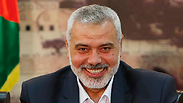
Hamas PM Ismail Haniyeh. 'Hamas' deep frustration stems from its illegitimacy'
צילום: רויטרס
Gaza: A terrorist state or an enemy state?
Op-ed: Israel should regard Hamas as a legitimate enemy in order to reach either an agreement or a head-to-head war.
When Israel was founded in 1948, the Jordanians bombed Jerusalem, imposed a siege on the country and killed hundreds of its residents. The legion fighters conquered Gush Etzion, killed many Israelis and murdered hostages in cold blood.
But throughout the months of this difficult and brutal war, no one referred to the Jordanians as terrorists but as an enemy. And in the midst of the terrible bloodshed, talks were held alternately between Israeli officers and Jordanian officers about ceasefire arrangements, until the shaky UN-brokered armistice agreements signed in 1949.
The Syrians bombed the Galilee Panhandle communities before the Six-Day War, killing and wounding quite a few residents, but no one called Syria a terrorist state but rather an enemy state. And not only did they not supply it with fuel and electricity, but they also sat down from time to time for talks and clarifications – face-to-face at the armistice committees.
Before 1967, terrorist cells emerged from the Egypt border and sowed death in the Israeli communities along the border, but no one referred to Egypt as a terrorist state but rather as an enemy state.
Although all these countries openly declared their intention to destroy Israel, at the start of every Knesset session the prime minister would turn to the Egyptian and Syrian leaders and call for a dialogue for the sake of calm and peace agreements.
Why is it that after the pullout from the Gaza Strip and the evacuation of communities, and after control of the Strip was handed over to Hamas, we continue to refer to the Strip as a terrorist state rather than an enemy state for all intents and purposes? Is the expression "terrorist state" stronger than the expression "enemy state"?
Or is it possible that the word "terror" indicates that, deep in our hearts, we still consider the Gaza territory as part of the Land of Israel, where we tried to settle but failed, but where we perhaps hope to return, and therefore its residents are not the residents of an enemy state but the Arabs of the Land of Israel who have terrorist cells operating among them?
Are we committed to the well-being of Gaza's residents in a way we were not committed in the wars of the past towards the residents of Syria and Egypt, and that is why we continue supplying them with electricity, fuel and food but at the same time – and that's the main point – refuse to suggest that the Hamas government in Gaza enter negotiations with us as we suggested and did in the wars of the past with the Jordanians, Syrians and Egyptians?
Do all these complexities and confusion stem from the fear that holding talks with Hamas for a ceasefire and positive moves to establish stable ceasefire armistice could "weaken" Mahmoud Abbas? But the ongoing killing in Gaza weakens the person who sees himself as the Palestinian people's leader even more.
And even if we assume this is indeed the concern, the question remains why when the Palestinian national unity government was established a short while ago, we didn't take the opportunity to talk to Hamas, thereby legitimizing the government controlling the Gaza Strip.
Hamas' deep frustration stems, in my opinion, from its fundamental illegitimacy in the eyes of Israel and most of the world. This frustration leads it to destructive acts of despair. So it's important to legitimize it at least as an enemy in order to reach either an agreement or a head-to-head war with all that it entails.
This is how we treated Arab states in the past. As long as we refer to Hamas as a terrorist gang which gained control of innocent civilians, we will not only fail to properly stop the fire in the south with a suitable combative response, but most importantly, we will not be able to enter open negotiations with the Gaza government on a gradual agreement which will include International supervision of the removal of missiles while lifting the naval, aerial and ground blockade, opening the crossing to Israel for the laborers working in Israel, and aspiring to open the safe passage between the Gaza Strip and the West Bank.
And what if, the skeptics will ask, Hamas refuses to sit down with us separately for open negotiations? Then we will suggest sitting down with it as part of the Palestinian unity government. And if it turns that down too, our war against it will be a legitimate war from every aspect and according to the proper rules of war.
But let us not forget, the Palestinians in Gaza are our neighbors forever and we are their neighbors forever. The currently bleeding abscess will not be healed by talking about terror but by turning to a dialogue or waging a war against a legitimate enemy which we have no territorial claims towards, apart from holding fire for good.










